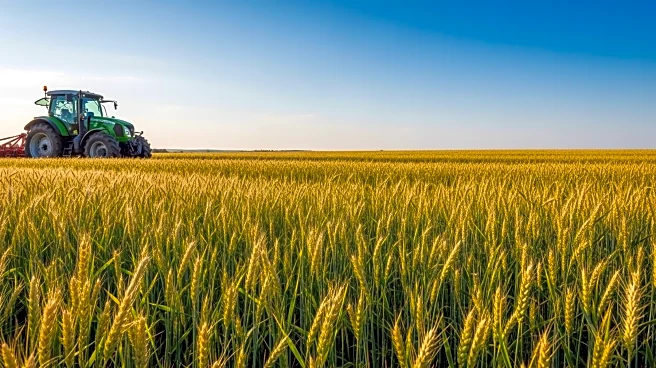What's Happening?
Dr. Philips Nto, Director of the Agribusiness Incubation Centre at Michael Okpara University of Agriculture, Umudike, has called for increased funding for agriculture in the 2026 budgets across all government levels. He emphasized that enhanced financial support is crucial for improving yields, adding value, and ensuring prosperity for farmers. Dr. Nto highlighted the importance of focusing on value addition to reduce post-harvest losses and suggested that the government should provide agricultural subsidies to genuine farmers. He also advocated for the revival of agricultural extension services to make them more functional, which would help farmers adopt new techniques for better yields. Additionally, Dr. Nto proposed the establishment of industrial agro-hubs in Nigeria's 774 local government areas, tailored to the crops grown in each region, to promote sustainable food security.
Why It's Important?
The call for increased agricultural funding is significant as it addresses the critical issue of food security in Nigeria. By prioritizing agriculture in the budget, the government can enhance the sector's contribution to the economy, especially as Nigeria's revenue is reportedly increasing. The proposed agro-hubs and improved extension services could lead to higher food production and better value addition, benefiting farmers and the economy. This initiative could also help mitigate post-harvest losses, a major challenge in the agricultural sector. Furthermore, the suggestion to use funds from new tax reforms for agriculture underscores the potential for integrated government efforts to drive growth in this vital sector.
What's Next?
If the government adopts Dr. Nto's recommendations, the next steps would involve allocating increased budgetary resources to agriculture and implementing the proposed agro-hubs and extension services. This could lead to collaborative efforts among various government tiers to fund these initiatives. The success of these measures would depend on effective policy implementation and monitoring to ensure that the funds are used efficiently and reach the intended beneficiaries. Stakeholders, including farmers, agricultural experts, and policymakers, may engage in discussions to refine and execute these plans.
Beyond the Headlines
The emphasis on agricultural funding highlights broader issues such as the need for sustainable development and food security in Nigeria. It also raises questions about the role of government in supporting critical sectors and the impact of fiscal policies on economic growth. The proposal to use tax reform revenues for agriculture suggests a strategic approach to leveraging financial resources for national development. Additionally, the focus on value addition and extension services points to the importance of innovation and education in transforming the agricultural sector.










